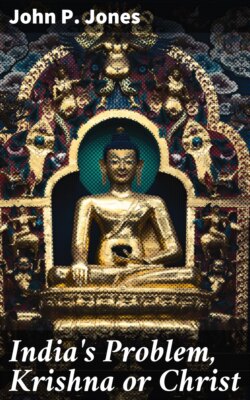Читать книгу India's Problem, Krishna or Christ - John P. Jones - Страница 23
На сайте Литреса книга снята с продажи.
5. The Ideals of the Two Faiths.
ОглавлениеTable of Contents
No religion can regenerate or exalt men simply through a code of moral laws, or even through impassioned appeals to a higher life and threats of eternal punishment. There must be, above and beyond all this, a life which stands boldly forth as an example and inspiration to good men. The noble example of the royal Gautama did more perhaps than any other thing to disseminate Buddhism throughout [pg 102] India. His supreme renunciation and his loyalty to truth exalted him before his disciples and transformed him into an ideal for Buddhists of future ages. This also is a preëminent characteristic of Christianity. It is the religion of the Christ. He stands supreme in it—not merely as its Founder, Expounder and Life. He is also the embodiment of His own teaching, the ideal of life and conduct which He has brought to men. His command to all is not—“Do this or that”; but “Follow Me”—not, “Believe in this truth or another,” but “Believe in Me,” who am “the way, the truth and the life.” For these twenty centuries He has stood before the world as the incomparable, unapproachable, perfect ideal which has wrought more for the regeneration of the world than all other forces put together.
Do we find any counterpart to this in Hinduism? Do we find any life or example which stands related to it as Buddha's to Buddhism or as Mohammed's to Mohammedanism, or, even in a slight degree, as Christ's to Christianity? None whatever. Starting with the absolute Brâhm, we have seen this Supreme Soul shrouded in unfathomable, unapproachable darkness. We descend to the divine emanations of this eternal Soul and search in vain among the millions of beings which constitute the Hindu pantheon to find one who could become an ideal of life and an inspiration to the soul struggling against sin. “Godlike life could scarcely start from its examples of incarnations; for none of their lives is superhuman in holiness. Even Rama, the most blameless character in Hindu mythological literature, is by no means perfect; while the most popularly [pg 103] worshipped incarnation committed deeds so vile that even the narrator warns his hearers not to take him for their example. ‘Listen to the story of Hari, but do not think of doing his deeds,’ he says.”
We look again at the sages and heroes of India with the hope that we may possibly find one who stood conspicuous among others as the perfect type of character and the helper of those struggling after a better and holier life. Here again we are wofully disappointed, though it must be confessed that there are loftier types of goodness and of self-discipline among them than we found among the gods. Thus, with no worthy ideal of life before them and no one to inspire them to better things, the wonder is that men in India have not descended to a lower level than they have. It is perhaps this very reason that has discouraged them and has led them to strive to attain unto beatitude, not by perfecting, but by destroying humanity. The renunciation and loss, rather than the realization, of self has thus become their aim and ambition. Perhaps it is for this same reason also that the votaries of this faith have constructed one of the most elaborate systems of ceremonial and ritual that the world has ever witnessed; whereby, in the absence of a high ideal and of a divine inspiration, the whole life from birth even until after death, may be directed and protected from evil.
